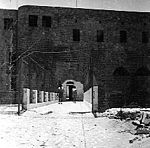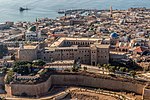Or Torah Synagogue
1955 establishments in IsraelAsian synagogue stubsBuildings and structures in Acre, IsraelIsraeli building and structure stubsSephardi Jewish culture in Israel ... and 5 more
Sephardi synagoguesSynagogue buildings with domesSynagogues completed in 1955Synagogues in IsraelTunisian-Jewish culture in Israel

The Or Torah or Djerba Synagogue is a Tunisian synagogue in Acre, Israel, built after the El Ghriba synagogue on Djerba. The building was erected in 1955. The building is covered with millions of mosaics inside which have been manufactured at Kibbutz Eilon. The building has 140 stained glass windows and a dome.
Excerpt from the Wikipedia article Or Torah Synagogue (License: CC BY-SA 3.0, Authors, Images).Or Torah Synagogue
Eliezer Kaplan, Acre Neve Yoni Netaniyahu
Geographical coordinates (GPS) Address Nearby Places Show on map
Geographical coordinates (GPS)
| Latitude | Longitude |
|---|---|
| N 32.924183 ° | E 35.076577 ° |
Address
אליעזר קפלן
Eliezer Kaplan
2451308 Acre, Neve Yoni Netaniyahu
North District, Israel
Open on Google Maps











